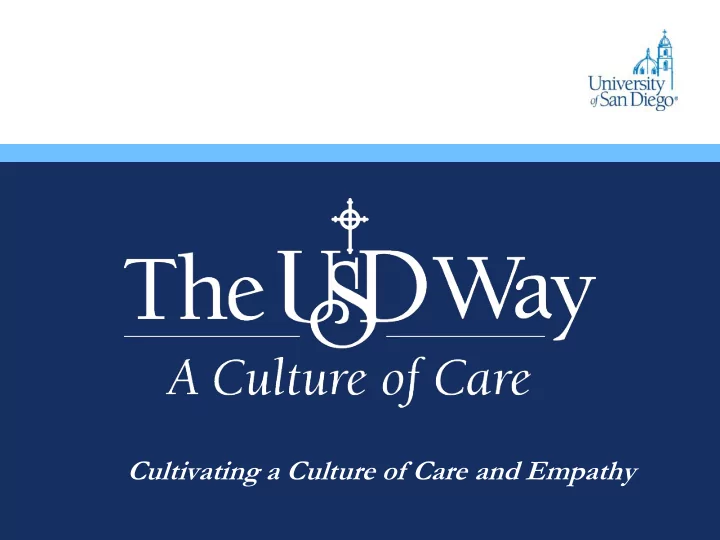

Cultivating a Culture of Care and Empathy
Community Guidelines • Turn off (or place on silent) and stack cell phones • Be open to the perspectives of others • What is shared in this room should stay in this room • Be willing to take risks and open up • Each person’s story is unique and has value • Our time together is precious • Use “I” statements (speak only for yourself) each of us has a unique experience • Keep an open mind
The USD Way • As a community, we pledge to respect the value and human dignity of each and every person. • We are committed to treating everyone with courtesy and compassion so that they feel valued, cared for and respected. • Our actions are grounded in our Catholic tradition of social justice and love for our community.
USD Mission Statement The University of San Diego is a Roman Catholic institution committed to advancing Academic Excellence, expanding liberal and professional Knowledge, creating a diverse and inclusive Community, and preparing leaders dedicated to Ethical Conduct and Compassionate Service.
Mingle Mingle
Mingle Mingle 1 What does a Culture of Care look like in our interactions with our peers on campus – whether in a classroom or the individuals you are working with? Share two examples
Mingle Mingle 2 What does our Culture of Care look like with those we serve in our roles on campus? Share two examples
Mingle Mingle 3 What does the Culture of Care not look like at USD? Share two examples
Cultivating a Culture of Care and Empathy What is The USD Way ? How do you cultivate a culture of care and An environment where empathy… everyone feels: • Valued • Cared for • Respected
Empathy v. Sympathy What is the difference between the two?
Empathy v. Sympathy Sympathy To express sympathy is to make it known that you are aware of another’s distress and that you have compassion for them; you feel sorry for them, but don’t know exactly what they feel. Empathy With empathy , you feel with a person and display compassion at a deeper level of understanding by stepping into the other person’s experience.
Brene Brown on Empathy
Some “What and Whys” of Empathy 1. It is a choice! 2. It can be developed with practice. 3. It is an essential skill for navigating personal relationships (de Waal, 2009) 4. Foundation for moral development (Eisenberg & Eggum, 2009) 5. Empathy allows us to contribute to something greater than ourselves. 6. Employers are seeking graduates who can demonstrate empathy (Colvin 2014)
What would you say/do? If someone walked into your area and had obviously been crying? If someone was extremely angry or frustrated?
Pair up with someone you do not know 1.) On the outside, on one side of your bag, write how you believe others perceive you. (silent exercise) 2.) On the other side, write down how you perceive yourself. 3.) Discuss the differences in perceptions (how we think others perceive us, and how we perceive ourselves) 4.) Where do you think these differences in perception come from? Is there something in our history, our stories that shapes these perceptions?
Pair up with someone you do not know 1.) Write down your answers to the questions on the cards inside the bag. (6 minutes) 2.) Move somewhere in the room with your partner. 3.) Share your answers with your partner. (20 minutes)
Free Write Reflection Based on the information shared with you, how might the experiences of your partner result in a different USD/life experience from you? What personal experience have you had that allows you to empathize with your partner? If you do not have a personal experience that directly relates, how can you still show empathy to your partner? How can you show compassion to them, and ensure they feel welcomed and valued at USD?
Empathy in Practice How has learning about the stories of someone different from you helped you understand the diverse experiences of others on this campus? How will you remind yourself to demonstrate empathy (even when you may not know someone’s story)? How will you model openness and compassion in your daily life on campus. How does this affect how you go about your work?
Closing “Empathy is the most mysterious transaction that the human soul can have, and it’s accessible to all of us, but we have to give ourselves the opportunity to identify, to plunge ourselves in a story where we see the world from the bottom up or through another’s eyes or heart.” ~Sue Monk Kidd
Recommend
More recommend